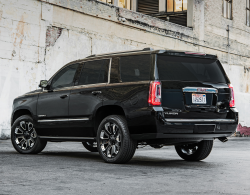
— A GMC Yukon tail light replacement lawsuit should be dismissed because the one Yukon owner who filed the class action allegedly doesn't legally own the SUV.
Florida plaintiff Rhonda Small says she owns a 2017 GMC Yukon which she purchased in February 2017, but nearly four years later the passenger-side Yukon tail light failed and required replacement.
She filed the GMC Yukon tail light class action lawsuit by alleging the tail light assemblies are defective in 2017-2019 GMC Yukon, GMC Yukon XL, GMC Yukon Denali and GMC Yukon Denali XL vehicles.
According to the plaintiff, the “tail lamps or particular components within the tail lamp housing or assembly become inoperative.”
The plaintiff says the GMC Yukon tail light replacement cost $671.85, and the problem is something GM has known about for many years.
The class action alleges the automaker knows about the tail light problems because of a special coverage adjustment (SCA) program issued by GM.
And the automaker also allegedly knows about issues based on “a myriad of complaints filed on the National Highway Transportation Safety Administration (‘NHTSA’) website regarding the Class Vehicles and lodged on online forums.”
The GMC Yukon tail light replacement lawsuit also alleges General Motors knows about alleged tail light defects based on bench testing of the SUVs.
Taking the Yukons to dealerships for repairs or replacements is also allegedly a waste of time because replacement tail light parts are usually on backorder.
Motion to Dismiss the GMC Yukon Tail Light Lawsuit
General Motors argues the entire class action lawsuit must be dismissed because the only plaintiff who sued doesn't legally own the GMC Yukon she sued over.
According to GM, "her lawsuit has an insurmountable defect: she never purchased, leased, or owned any of the vehicles in her class definition."
Attorneys for GM say the plaintiff doesn't have standing to sue because GM's records confirm a corporate entity bought and owns the 2017 GMC Yukon XL the plaintiff claims to own. This means she allegedly lacks standing to assert claims on behalf of a class of owners of which she is not a member.
GM also argues she couldn't have suffered any "cognizable injury" for a Yukon she doesn't own, and she also allegedly cannot assert claims for GMC Yukons beyond just the 2017 model.
GM also points out how the plaintiff admits GM issued an extended warranty for Yukon tail lights, a program called a "special coverage adjustment."
The class action lawsuit alleges the SCA replaced failed GMC Yukon tail lights for free, reimbursed owners and lessees who paid for Yukon tail light replacements and covered the replacements for 6 years or 72,000 miles.” However, the lawsuit alleges GM didn't include the 2017 GMC Yukon in the SCA program.
In its motion to dismiss the lawsuit, GM says this "is plainly false" because GM issued a revised SCA extending the warranty program to 2017 GMC Yukon, Yukon XL, Yukon Denali and Yukon Denali XL vehicles.
And GM says the business which purchased the GMC Yukon allegedly owned by the plaintiff received notification of this tail light SCA extension in June 2020.
The non-ownership problem is allegedly enough to throw out the entire class action lawsuit. But General Motors also says warranty claims fail because the plaintiff never had a direct relationship with GM, and she allegedly didn't provide the required pre-suit notice to the automaker.
"Plaintiff does not allege that she requested a repair or replacement of her tail lamp described in the warranty, much less that GM denied her or any other vehicle owners such a repair. And even if GM had denied a repair, Plaintiff alleges that her purported tail lamp failure occurred nearly a year after her warranty had expired, negating any claim of breach." — GM's motion to dismiss
According to the automaker, the Magnuson-Moss Warranty Act claim fails because it does not satisfy the 100-named plaintiff minimum requirement for class action lawsuits.
The motion to dismiss also argues the plaintiff failed to file her claim within the applicable four-year statute of limitations.
The motion also alleges the Yukon tail light replacement lawsuit never identifies any misleading statements by General Motors, and allegedly provides no information about the vaguely-referenced “bench testing” performed by GM.
As for “complaints to government agencies,” GM argues every single referenced complaint post-dates the purchase of the plaintiff's vehicle purchase.
The GMC Yukon tail light replacement class action lawsuit was filed in the U.S. District Court for the Southern District of Florida: Rhonda Small, v. General Motors LLC.
The plaintiff is represented by Freidin Brown, P.A., Pomerantz LLP, and Justice Law.




